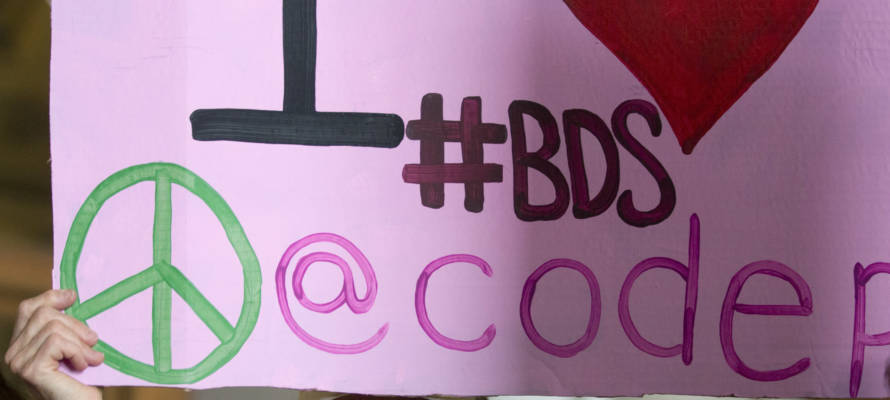
American congressmen, a German MP, and international legal scholars condemn EU-enforced labeling of Israeli products. You can join them here.
A number of prominent international figures oppose the latest EU boycotts targeting Jewish communities located beyond the green line as an obstacle to peace negotiations. These political leaders are hoping to reverse the EU policy, which according to EU Foreign Policy Chief Catherine Ashton will include comprehensive guidelines on labeling products originating in Judea and Samaria by the end of this year.
The Israeli Foreign Ministry has expressed concern that such labeling would lead to boycotts. Three Dutch retail chains and one German supermarket chain have already announced that they won’t carry beyond-the-green-line products in the wake of the EU boycott announcement.
US CONGRESSMEN CONDEMN EU BOYCOTT
The heads of the bipartisan Israel Allies Caucus in the US Congress have written Ashton to express “deep concern” about the EU’s intention to ban funding to Israeli governmental and communal organizations as well as businesses in Judea and Samaria, East Jerusalem, and the Golan Heights. “We strongly believe this move is counterproductive to sincere American efforts to restart peace talks between the Israelis and Palestinians. The new guidelines will only serve as a disincentive for the Palestinian Authority to engage in serious final status negotiations,” wrote the co-chairmen of the caucus, Eliot Engel (NY-16), Doug Lamborn (CO-05), Trent Franks, (AZ-08) and Brad Sherman (CA-30).
“It is our belief that a sustainable framework for peace can only be decided through direct negotiations between Israeli and Palestinian leadership,” the letter went on to say. “Like you, we want to achieve a peaceful, negotiated, solution to this conflict. But, the cause of peace is not advanced by the EU placing blame for lack of progress solely on Israel’s shoulders. This is simply not the case. We encourage you to reconsider the publication of these guidelines and hope to work with you to seek an end to the Israeli-Palestinian conflict.”
GERMAN MP CONDEMNS EU BOYCOTT
Although Germany is an EU member, the German government has already begun to distance itself from the EU boycott. In a statement issued by MP Philipp Missfelder, the Bundestag spokesman for German chancellor Angela Merkel’s Christian Democratic Union party, Missfelder argues that the EU boycott was “pure ideology and symbolic politics” that will not contribute towards finding a solution to the Palestinian-Israeli conflict. He added that only 0.5 percent of EU money was directed towards projects in the disputed communities.
Furthermore, “Israel is the recognized administrative power in the territories without which approved development projects like solar energy or sewage works could not be installed,” Missfelder said. He emphasized that an implementation of the new EU boycott could mean an “end of research cooperation with the Hebrew University in Jerusalem because some of their academics have an address in East Jerusalem.”
ISRAELI LEGAL EXPERTS CONDEMN EU BOYCOTT
Additionally, hundreds of legal experts from Israel and around the world have written to Ashton, asking her to reverse the EU boycott of Jewish communities beyond the green line. Some of the signatories of this petition spearheaded by the Legal Forum for the Land of Israel include international law experts Professors Eliav Shochetman and Talia Einhorn. “The EU’s definition of Judea and Samaria as ‘Palestinian territories’ or ‘occupied territories’ is devoid of any legal or factual merit,” the petition says.
TO EMAIL THE EU YOUR POSITION:
Contact: maja.kocijancic@ec.europa.eu
H.E. Catherine Ashton, EU Representative for Foreign Affairs
Feel free to use this wording:
As an individual closely concerned with the Israeli-Palestinian conflict, I respectfully call upon you and the European Union to revoke directives calling for the boycott of Jewish communities located beyond the green line. Such legislation does not advance the cause of peace. As US Secretary of State John Kerry attempts to launch peace negotiations between Palestinians and Israelis, PA spokesman Nabil Abu Rudeineh claimed that Israel would still have to agree to the pre-1967 borders and halt construction in Jewish communities in Judea and Samaria for negotiations to actually occur.
The Palestinians want their objectives to be reached before actually having to sit down to talk. An EU boycott of Jewish communities in Judea and Samaria at this time sends a message to the Palestinians that they will get everything they want without being required to stop inciting anti-semitism in their media, renounce violence, recognize Israel’s right to exist under any borders, or make painful compromises, such as giving Israel security guarantees as recognized in UN Security Council Resolution 242. This is especially true when the EU decides to punish the only negotiating party willing to hold peace talks without preconditions. The EU boycott encourages Palestinian intransigence and reduces the chances that US Secretary of State John Kerry will be successful. If the EU cares about the peace process, please give these negotiations a chance to succeed and cancel these boycott measures.
Sincerely,
Your Name


